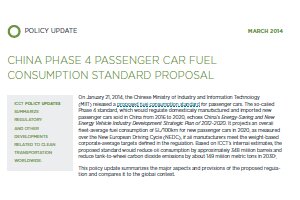 The Chinese Ministry of Industry and Information Technology (MIIT) published the proposal for the phase 4 fuel economy standard (FES) on January 21, 2014 and it is available for commenting. It regulates, similar to the US CAFE and the European CO2-Standard, the fuel consumption of domestically manufactured and imported passenger vehicles for the years 2016 through to 2020. Under the new rule, the overall fleet-average fuel consumption is projected to be 5.0L/100km by 2020 as measured by the New European Driving Cycle (NEDC).
The Chinese Ministry of Industry and Information Technology (MIIT) published the proposal for the phase 4 fuel economy standard (FES) on January 21, 2014 and it is available for commenting. It regulates, similar to the US CAFE and the European CO2-Standard, the fuel consumption of domestically manufactured and imported passenger vehicles for the years 2016 through to 2020. Under the new rule, the overall fleet-average fuel consumption is projected to be 5.0L/100km by 2020 as measured by the New European Driving Cycle (NEDC).
Compared to the Phase 3 standard, which sets the target for the corporate-average fuel consumption (CAFC) to 6.9L/100km, the new consumption target is 28 percent lower. In addition to CAFC targets, the proposal sets vehicle-specific limits to individual car consumption. Both standards have to be met by the manufacturers and importers.
Similar to the current third phase, the proposal incorporates extra credits for new-energy vehicles (battery-electric, fuel cell and plug-in hybrids) and other ultra-low fuel consumption vehicles (with an average combined fuel consumption ≤ 2.8L/100km). In addition, the proposal grants extra credits to vehicles equipped with innovative technologies leading to real-world fuel savings.
Compared to similar standards in other ambits, the nominal stringency of the proposed FES targets would put China in third position after Europe and Japan. The proposal does not detail management rules or enforcement mechanisms as of yet.
The original document can be found here (Chinese). For an in-depth analysis of the proposal also see the ICCT’s summary and evaluation (English).


